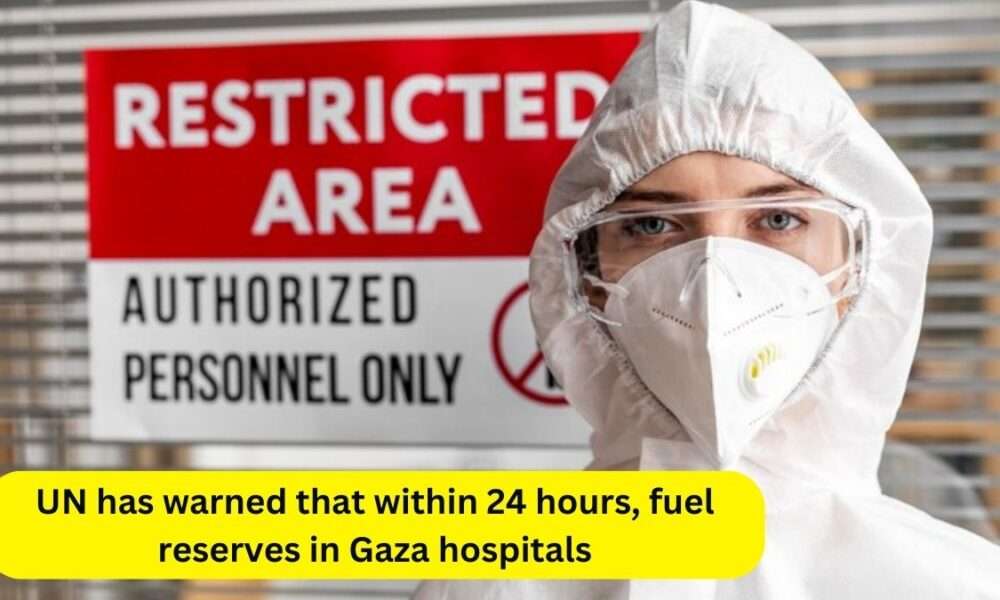The Gaza hospitals is facing a severe emergency, with the healthcare system nearing collapse and potential catastrophic effects on the population. The United Nations warns that hospitals may run out of gasoline within the next day. In this essay, we will investigate this impending problem from every angle, looking into its origins, its potential outcomes, and the worldwide response it has already attracted.
The Fuel Crisis in Gaza Hospitals
The Urgent Situation
Medical facilities in Gaza rely largely on gasoline to run life-saving devices like generators and ambulances. Hospitals are in a race against time to figure out what to do about their decreasing fuel supplies.
The Role of Fuel in Hospitals
Hospitals couldn’t keep their doors open and deliver round-the-clock treatment without fuel. It powers critical functions like lighting, life support equipment, and refrigeration for medications.
UN’s Warning
Immediate Consequences
If Gaza hospitals run out of fuel, the immediate consequences are alarming. Surgery may need to be postponed, and patients on life support may be in immediate risk. The number of avoidable fatalities might rise as a result of this.
Humanitarian Crisis
The United Nations has issued a warning that this is not only a healthcare crisis, but a humanitarian one as well. Any further deterioration of Gaza hospitals already strained healthcare system might have fatal consequences.
What’s Causing the Fuel Shortage?
Blockade and Restrictions
The delivery of gasoline and other necessities into Gaza has been significantly impeded by the embargo that has been in place for years. The resulting scarcity has been a persistent issue.
Economic Challenges
Gaza’s economy is deeply strained, leading to difficulties in procuring fuel supplies. High unemployment and poverty rates exacerbate the problem, making it harder to afford fuel imports.
Political Unrest
Due to supply chain disruptions caused by regional political instability, keeping adequate fuel stocks has become more difficult. The political context further complicates the matter.
The Impact on Healthcare
Suspended Services
As fuel reserves deplete, hospitals are being forced to suspend non-critical services and conserve fuel for essential operations. This includes limiting the use of ambulances for emergencies.
Deteriorating Conditions
A rise in disease transmission and a decline in patient outcomes may result from Gaza hospitals poor facilities. In order to avoid a healthcare disaster, speed is of the essence.
International Response
UN’s Appeal
The United Nations has issued a dire plea for money to help the hospitals in Gaza. To avoid the situation, they are looking for help from other countries.
Assistance from Aid Organizations
Fuel and medical supplies are being sent into Gaza by a number of humanitarian organisations. These groups are extremely valuable in assisting healthcare facilities in dealing with the fuel scarcity.
The Urgent Need for Solutions
Advocacy and Diplomacy
Diplomatic efforts are needed to address the root causes of the fuel scarcity in Gaza, which will lead to long-term solutions. Ending the embargo and fostering peace in the region requires strong lobbying on a global scale.
Public Awareness
Educating the public about the Gaza crisis can inspire action and increase government pressure, as every voice is crucial in advocating for change.
Conclusion
The fuel shortage in Gaza’s hospitals could have severe consequences on patients’ health and the lives of the local population. The world community must act immediately to prevent this disaster, requiring collaboration between individuals, groups, and governments.
FAQs
What caused the fuel shortage in Gaza hospitals?
The shortage is primarily due to the blockade, economic challenges, and political unrest in the region.
How can I help Gaza hospitals in this crisis?
You can support international aid organizations working to provide fuel and medical supplies to Gaza.
What are the immediate consequences of hospitals running out of fuel?
Immediate consequences include endangering patients on life support and postponing surgeries.
Why is the United Nations so worried?
Concerns have been raised at the United Nations (UN) because this is more than a medical emergency; it is a humanitarian catastrophe with potentially dire consequences.
What long-term answers can we find to the fuel situation in Gaza?
Diplomatic initiatives to lift the embargo and foster regional peace, as well as public awareness campaigns to exert pressure for change, are all part of a long-term strategy.
Read More: Techburneh.com










